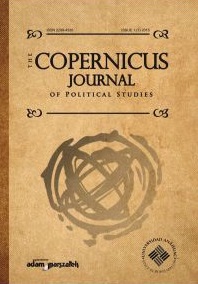Israel in a New Middle East: How to Respond?
DOI:
https://doi.org/10.12775/18348Słowa kluczowe
Israel, foreign policy, the Middle East, the Arab-Israeli conflict, Iran, Syria, Russia, U.S., the Arab Spring, Arab revolts, the Iranian nuclear programAbstrakt
Israeli foreign policy, its mechanisms, conditions, as well as driving forces is a complex phenomenon composed of intersecting elements of security, defense, and foreign interests that are inseparably braided. Generally speaking, there are at least four main interests which determine states’ foreign activity, firstly security of the state and its territory, secondly economy and development, thirdly international position, prestige among other states, and lastly international society common benefits. The only way to understand Israel’s international conduct is to look deeper into its national identity, political tradition, and historical burden as well.
So the goal of this paper is to study the priorities of the Israeli foreign policy, particularly while the so called Arab Spring, crisis over Iranian nuclear program, and the changes in the Middle East.
Full text: http://bazhum.muzhp.pl/czasopismo/589/?idno=14763
Bibliografia
Brom S., The Crisis in Israeli-Egyptian Relations, “IN SS Insight” 2011, No. 278.
Cafiero G., Syria: America versus Israel, “Asia times” June 6, 2012.
Cafiero G., Syria: America versus Israel, “The Asia Time” June 6, 2012.
Dekel U., Perlov O., President Morsi and Israel-Egypt Relations: Egyptian Discourse on the Social Networks, “IN SS Insight” 2012, No. 357.
Downing B., The Israeli Endgame in Iran, “Asia Times” June 27, 2012.
Eran O., Jordan’s Internal and External Pressure Cooker, “IN SS Insight” 2012, No. 358.
First T., Yogev E., Jihad in Syria: The Penetration of Radical Islam in the Syrian Conflict, “IN SS Insight” 2012, No. 355.
Herzog M., Cagaptay S., How America Can Help Its Friends Make Nice, “The New York Times” June 20, 2012.
Heydarian R., Israel Hampers Diplomacy on Iran, “Asia Times” August 10, 2012.
Inbar E., The 2011 Arab Uprisings and Israel’s National Security, “Mideast Security and Policy Studies”, No. 95.
Israel and Iran, “The New York Times” August 13, 2012.
Israel’s Strategic Agenda, E. Inbar (ed.), London 2007.
Miller A., Israel’s Image Revisited. What’s Driving Israel’s Very Bad PR?, “Foreign Policy” May 16, 2012.
Reich B., Israeli Foreign Policy [in:] Diplomacy in the Middle East: The International Relations of Regional and Outside Powers, L. Brown (ed.), London 2006
Rubin J., The Real Reason to Intervene in Syria Cutting Iran’s Link to the Mediterranean Sea Is a Strategic Prize Worth the Risk, “Foreign Policy” June 4, 2012.
Shalom Z., Israel and the United States in Disagreement over Iran, “IN SS Insight” 2012, No. 340.
Shalom Z., The US on an Israeli Military Strike against Iran: A Change in Position?, “IN SS Insight” 2012, No. 317.
Zakaria F., Netanyahu U., Israel Is Stronger than Ever, “Washington Post” May 10, 2012.
Opublikowane
Jak cytować
Numer
Dział
Statystyki
Liczba wyświetleń i pobrań: 0
Liczba cytowań: 0



